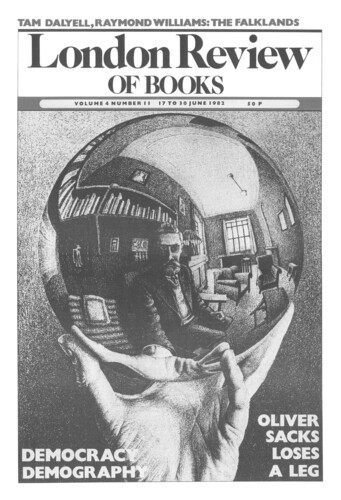In Lincoln Museum
The rock-tree underground
Moving its boughs slowly,
The sky-blue flintfruits
Rising in the soil
Gradually like sealed firmaments;
Knapped open they show
Blue and cloudy white;
Or like bubbles of the oozy bedrock,
Like sky-blue apples falling upwards
Very slowly. The hollow blue-black
Underground tree of the mine,
The thick orchards of the mines
Berried with flints, and these blue fruits
Are full of stars, their darkness
When struck is full of stars, a sneeze
Of stars, like the grindstone
At the cottage door sparking in the twilight.
The mining tools in the flint mines
Were flint axes, fruits
Cut down with themselves, as though
I used wooden axes to cut down elms,
Or inspired by cider combed my boughs of apples.
The shafts were excavated with antler picks,
Thirty feet down through chalk and sand,
For the best flint called Floorstone;
The hairy matriarchs
Dug by the light of pith wicks
Floating in animal fat in chalk lamps,
Like their own bright eyes
Floating in their chalky skulls;
I inspect three skulls of matriarchs now,
In glass cases smeared with fingerprints;
The sparks of their picks groping the walls,
The rock-tree’s underground shifting
Its tunnelled boughs slowly, matriarchs
Crawling along the hollow boughs creaking
Their stone leaves full of fruit, falling sometimes,
Crushing them as in flint-glass mills.
Buttons
I
A collection of buttons as frightening as medical pills,
Red buttons, small devilish faces, buttons
Fashioned like flames peeping out of seams,
Like countenances askew or dangling awry on one thread,
Buttonholes buttoned crooked, double-buttonholes,
Metal studs like electrical contacts, buttons strangely-stained,
Buttons with conchoidal fractures and with chips missing,
A button-box like a beach of buttons to the fleshly sea,
Tilt it and there is the sound of waves on shingle,
Shifting tons of shingle, all made of buttons.
II
Among these frightening buttons with their smell
Of bones and glue, are a few diamonds,
Diamanté buttons, figures of dancers twirling on their points
With diamond-studded dresses, cryptic
Diamanté stars, all shingling in the box,
The biscuit-box with on the lid
The colour portraits taken in a bright light
Of the excellent braided custard-creams and dusky bourbons
Larger than life and brightened beyond it, but
What is there in this old tin to eat?
Buttons.
III
Open it, and you find buttons, strange
Droplet distillation of forgotten garments,
Just as the bones survive, so do the buttons,
(The flouring of buttons into their downy dust)
They swept up the bones and picked out the buttons
From between the ribs, and the dust they threw on the wind,
The bones and buttons into respective boxes.
IV
Separate the brass buttons too dominant for a mother’s tin,
The martial buttons the shape of swollen cheeks,
The puffed-out domes carved
With charging horses and crossed sabres, sadly stained.
V
The buttons are a concentration, the feeding child
Fingers the button of the wide-open blouse,
They have a centred look, the circles crossed,
They will act as talisman of the beloved, a button
From her dress is strong as a portrait: though
Her printed dress might seem banal, wherever it fastens
A little face of the beloved will seem to peep.
VI
Shake my mother’s button-box. The large and frailer buttons
Rise to the surface like a spume, like round rafts
Or brown waterlilies with symmetrical perforations,
The little hard brutal berrylike buttons sift, the metal studs
And poppers lie in their mineral strata far below;
The bubbles of bone and metal, the focusing
Devices of dress, for where it parts and fastens
The bare place looks at you,
From where it is uncovered or about to be uncovered,
The long fingers wandering to the buttoned neck,
Or through the cloth like an impresario
Counting his audience, unbuttoning
The theatre-curtain flap in hush of overture,
Timing the acts on his round wristwatch which
Is a witchcraft button, ticking.
Butchers
The butcher’s red shop hard by the public rose-garden,
The roses like hacked ends, alas,
The meat blooming, and blood-buds on the sawdust,
Which wasps come to devour and not bees to sip.
The Butcher’s of veined slabs and gilt letters,
The hands of butchers so white they do not need blood
Like plump flour-blooded moths visiting their gardens
Of the roses out of the pigs, the sty-roses,
The white hands running over pigs
Opening lardy buds and rose-sutures.
A savage gothic laugh from the coldstore,
The lusty men of cold steel,
The rapierists swashing good-tempered blades,
The exploding light of the cleavers.
It is asking for it to order a nice leg
Or chicken-breasts in the body-shop,
They pinch it and wink, or what about this then?
Slapping a length down on the cold stone counter.
At his reunion, the butcher’s campaign medals
Tinkle like distant bayonets; peering over the park wall
The roses like a bombed cloud of spirits,
He snuffs up the perfume of their transformed sweat,
Sausage-fetterer, blood-seedsman,
Scalding his kidney-trays,
Hosing down his freezing slabs at night,
His violet light that butchers flies
Switched off until morning and the dawn of meat,
Or burning through the night, shingle of hygiene.
Send Letters To:
The Editor
London Review of Books,
28 Little Russell Street
London, WC1A 2HN
letters@lrb.co.uk
Please include name, address, and a telephone number.

